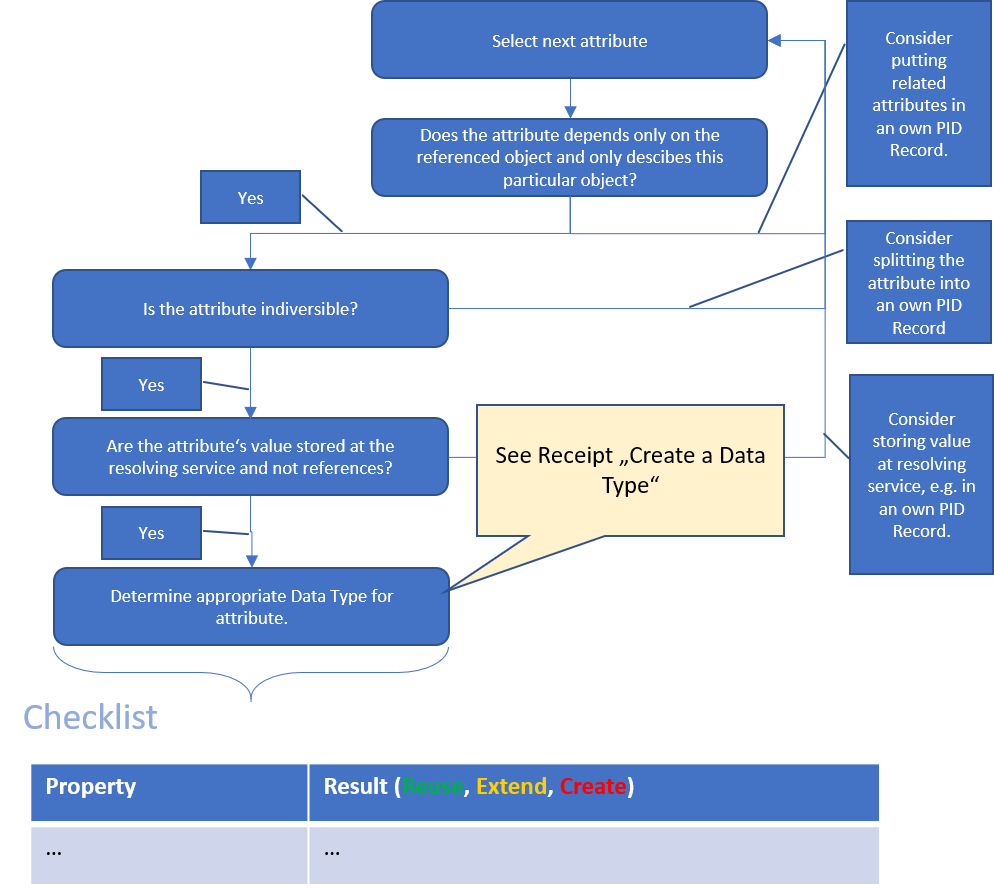2.2 Decide on KIP contents
With our six key principles in mind, we can now start defining our PID Kernel Information Profile. As a basis, it is highly recommended to adopt the Recommendation on PID Kernel Information of the Research Data Alliance. Doing so, we'll start with a couple of recommended elements.
| Property | Description |
|---|---|
| kernelInformationProfile | PID of the KIP for this PID record |
| digitalObjectType | PID of the Data Type of the referenced object |
| digitalObjectLocation | Location URL of the referenced object |
| digitalObjectPolicy | PID of the policy object with e.g. license information |
| etag | Etag of the current state of the referenced object |
| dateModified | Last modification date of the references object |
| dateCreated | Creation date of the referenced object |
| version | Version of the referenced object |
| wasDerivedFrom | PID of another object according to PROV-DM recommendation |
| specializationOf | PID of another object according to PROV-DM recommendation |
| wasRevisionOf | PID of another object according to PROV-DM recommendation |
| hadPrimarySource | PID of another object according to PROV-DM recommendation |
| wasQuotedFrom | PID of another object according to PROV-DM recommendation |
| alternateOf | PID of another object according to PROV-DM recommendation |
As we've learned in the recipe on Create a Data Type, we now prepare our checklist containing at least the recommended properties and their Data Type PIDs.
| Property | DTR Inquiry Result (Reuse, Extend, Create) |
|---|---|
| kernelInformationProfile | KernelInformationProfile (21.T11148/076759916209e5d62bd5) |
| digitalObjectType | digitalObjectType (21.T11148/1c699a5d1b4ad3ba4956) |
| digitalObjectLocation | digitalObjectLocation (21.T11148/b8457812905b83046284) |
| digitalObjectPolicy | digitalObjectPolicy (21.T11148/8074aed799118ac263ad) |
| etag | etag (21.T11148/92e200311a56800b3e47) |
| dateModified | dateModified (21.T11148/397d831aa3a9d18eb52c) |
| dateCreated | dateCreated (21.T11148/397d831aa3a9d18eb52c) |
| version | version (21.T11148/c692273deb2772da307f) |
| wasDerivedFrom | wasDerivedFrom (21.T11148/c6e4c19f294ee6f41b1e) |
| specializationOf | spezializationOf (21.T11148/ab53242825e85a0a7f76) |
| wasRevisionOf | wasRevisionOf (21.T11148/2a1cad55473b20407c78) |
| hadPrimarySource | hadPrimarySource (21.T11148/a753134738da82809fc1) |
| wasQuotedFrom | wasQuotedFrom (21.T11148/beaeecebec408908de35) |
| alternateOf | alternateOf (21.T11148/432132bdbd946b2baf2b) |
Now you may add additional properties, which you need according to your use case, e.g., the reference to a utilized instrument, geo location information, data format information, or information about software that can be used to process the referenced resource. Afterwards, for each of the added properties the following evaluation process, similar to the Data Type Registry Inquiry while creating a new Data Type, has to be performed.

After this process, you'll end up with a checklist containing either matching Data Type PIDs for all your properties or you'll have to create a new Data Type for the one or the other property. In that case, please refer to the recipe Create a Data Type before you proceed.